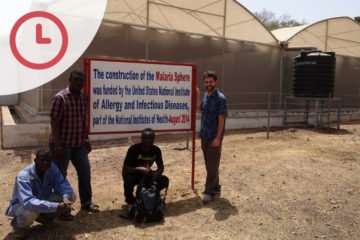Podcast Available on iTunes and Spotify.
Welcome back to Five Minutes, the podcast series where we speak to the most interesting people in the world of malaria.
Today I’m really excited to be joined by Dr Michelle Wykes all the way from Brisbane, Australia.
She runs the Molecular Immunology unit at QIMR Berghofer Medical Research Institute and has been focusing on trying to improve the immune system’s response to a malaria infection.
And she joins me now, good afternoon Michelle.
I’m welcome to be here, thank you for inviting me.
Your work focuses on two part of the immune system that responds to infections: dendritic cells and T cells, could you give us an overview of what these cells do when it comes to fighting malaria and why they are often referred to as army generals and soldiers?
Ok, so I refer that dendritic cells as the generals of the immune army, others refer to them as centrals their main responsibility and immune system to recognise that we have an invader, whether it’s a pathogen like the malaria parasite or whether it’s a cancer cell. The dendritic cells are the ones of sense there’s a problem and then provide the signals or the call out to the immune cells that are going to fight disease which are the T cells. I focus on lymphocytes and these are the cells that are capable of releasing chemicals to destroy the parasite or recruiting T cells to make antibodies. So that’s basically why I call them the army.
And it’s been long understood that a certain dendritic cell sends a message to fight infection to the T cells through a particular protein. But what you found is another protein essentially overrides this protein. Could you tell me more about that?
Sure, so another way of using analogies to explain this is you can imagine when you have an infection, you have a battle going on where you have these immune cells that are fighting disease. Now what happens is at the end of a battle under a normal infection, say a measles virus, the signal is sent by a dendritic cell to the T cell that says ‘stop, the war is over you don’t continue’ otherwise you would just be a walking bag of immune cells. But what has happened is cancer and malaria and HIV have found a way to stop the signal and they confuse it. So let me explain, the signal on the T cell is called PD-1 and they’ve got really important therapies in cancer to block PD-1 and the signal that comes from a DC, a dendritic cell, a general of the immune army is called PD-L1 and PD-L2, and these signals were thought to send the stop signal to the T cell. But what we found was that PD-1 one wasn’t a stop signal, it was actually a controller. It was actually deciding if the immunity went on or off and so you had PDL-2, then you would have a great immune response and a malaria signal that maintains immune response is lost.
And you’ve proved this?
Well, we looked at human samples, we looked at mice and what we were able to find is that when humans that after they got malaria they lost this protein from their dendritic cells, it was just gone within seven days of an infection. And in mice what we found was it was gone and if we could make an artificial form, we could improve immunity and vice versa. If the mouse had this protein in a non-lethal infection, you could actually block it and show that you had a problem. So we were manipulating these signals and we could clearly show that you needed PDL-2 on these dendritic cells to get a healthy immune response against malaria.
How long is an individual protected for?
So this is the interesting thing, at the moment all our work has been done in mice, I have to clarify, in terms of understanding the length of protection. But what we do know in mice where normally the infection will be lost within three or four months, you wouldn’t get that same amazing protection. If you can introduce the PDL-2 protein into the system, you can get absolutely complete protection after 150 days. Now, that is the sort of protection you don’t even get with vaccines. That is, you introduce the infection, you give it the treatment but 150 days later when you re-infect the parasite into the mouth, it is so well protected, you can’t even detect the parasites in the blood.
So is the solution to the malaria burden to give people some doses of PDL-2?
Well, that’s easier said than done because unlike most drugs, it’s quite costly to make these proteins but I’m working really hard to find a way to get this down and make it possible.
Dr Michelle Wykes, thank you.
You’re welcome. Thank you for inviting me again.


